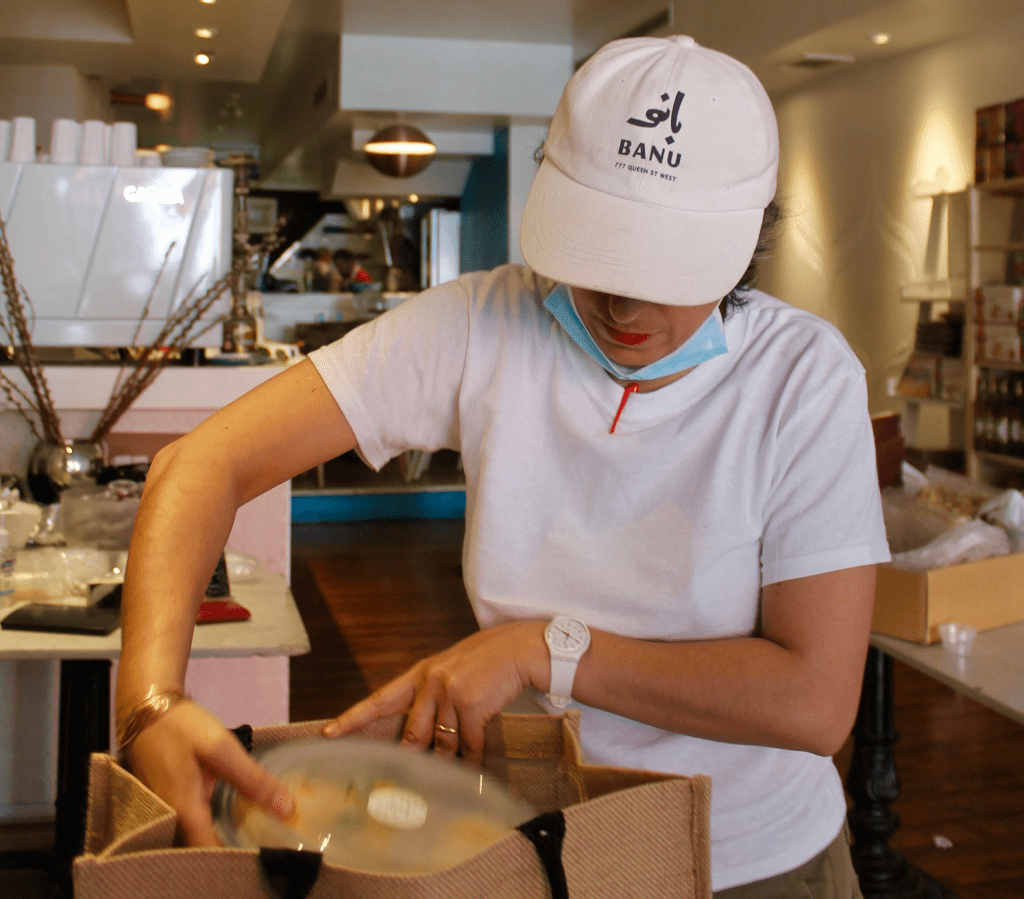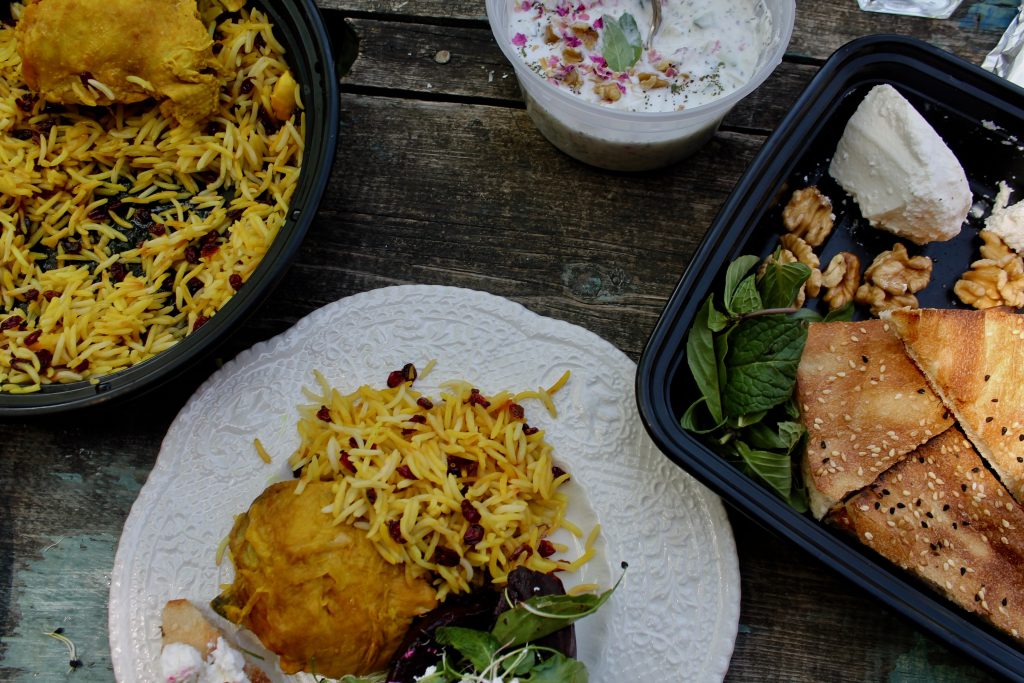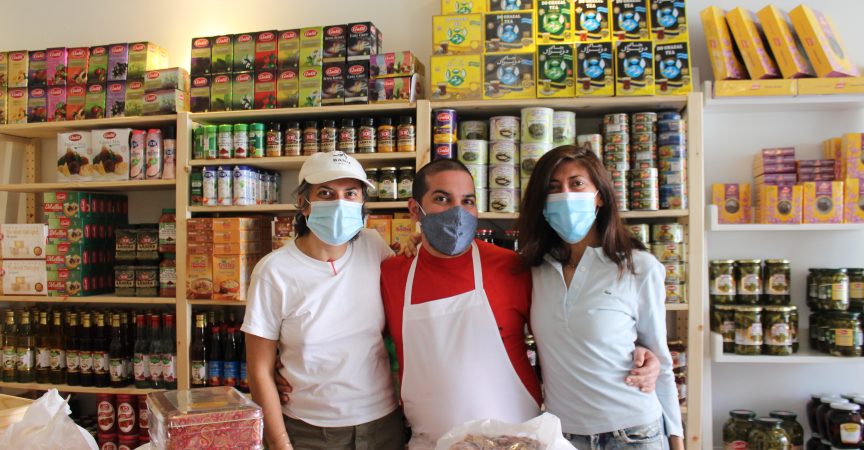The Road to Recovery: Operators across Canada are making the best of a bad situation
Ali Khan Lalani’s parents emigrated from Uganda to Ontario in the 1970’s and became restaurateurs. Growing up, Lalani worked at the family business, Diana’s in Guelph, from the time he was nine years old. “It was the kind of diner where you could order bacon and eggs or lamb vindaloo.”
He peeled potatoes, washed dishes, and bussed tables. At thirteen he was put on toast-making duty, then prep. By sixteen he says, “I could almost keep up with the cooks on the line.” At 25 he bought a Swiss Chalet franchise in Guelph, taking over a location that had been in business since 1978. “There were 82 union employees. I had staff who were celebrating their 20th anniversary within the first month of my taking over. It was a family.”
By the time he was 31 he had three locations. “When I started we were doing 80 per cent dining room and 20 per cent take out.” That changed as he watched the demand for takeout rise. “I had massive dining rooms that were half empty.” He wanted to change too, but being a franchisee he had to stick with the model. In 2015, at 32, he sold everything and moved to Toronto. In 2017 he realized a lifelong dream and opened a pizzeria. Hiring International Pizza Consultant, Anthony Falco (a founding member of the Roberta’s team), Ali’s spot was included in Toronto Life’s ‘Best New Restaurant’ list that year. He based the design on the Swiss Chalet model where the dining room allows for sit down service and an attached take out area, with a separate entrance accommodating pick up orders. Even though he’d watched takeout grow at Swiss Chalet he still had to have a dining room, his new pizzeria was in the Financial District after all, and people would always want table service.
Sarah Bennetto O’Brien grew up in Northern Ontario and moved to Prince Edward Island fifteen years ago. She started The Handpie Company in 2014, selling mostly to grocery stores and a core group of diehard customers. Her bestsellers are the bacon cheeseburger hand pie, the PEI pasty, and the curried chickpea. She sells them out of her production facility seven minutes from the Confederation Bridge.
A little known fact about Islanders is that they abhor driving any kind of distance for anything. Every community on the island is self-sustaining with its own grocers, banks, and perhaps, most important, hockey rinks.
“Anywhere else, when you have an hour commute to work each way it’s not a huge deal. It’s a bit different on the island.” Because of this, while she does some retail out of the shop, grocery stores are her main focus. This past winter she created a ten-pack box for frozen hand pies, it launched a month before COVID hit.
Heat Laliberte was born in Saskatchewan and moved to Vancouver at 16. The Cree-Métis chef was working as a butcher and charcutier at the Fairmont Pacific Rim in Vancouver when he saw an ad for an Indigenous entrepreneur program. He applied and got in. That’s where he developed the model for his hand-cured bacon business, One Arrow Meats. He rented out space at a butcher shop and began hauling bacon all over town, selling at the eight Vancouver Farmer’s Market locations and through specialty food shops. While getting the bacon business off the ground Heat was also working full time for a catering company. In January of 2020 One Arrow had grown enough that he was ready to take some big steps. He found a commissary kitchen, applied for permits, and quit his day job. He was ready to take his bacon to the next level.
While he was
waiting for those permits to get approved the virus hit the West Coast.

In 2005, the Moyheddin siblings, Amir, Samira, and Salome, opened a restaurant on a sketchy street in Toronto. Called Banu, which means “lady” in Persian, they put a picture of their beloved mother behind the bar and opened the doors to sell the Persian dishes she raised them on. The restaurant thrived and that sketchy street got hip. Now Queen West is home to some of the best restaurants in the city, Banu among them. This past winter they started planning an anniversary party for spring, to commemorate fifteen successful years of the family business. A mandatory shut down in March meant the siblings had to shelve the party plans. They didn’t know if they’d still have a restaurant left to celebrate.
In mid-March Ali closed General Assembly Pizza and laid off most of the staff. He kept the core members of his team and they sat down in the empty dining room to figure out a plan. “It was the first time since we opened that we’ve been able to sit down for more than an hour, and just come up with ideas as a team.” By the end of March, they rolled out frozen pizzas and fresh pizza kits. “Without them, we wouldn’t have been able to keep the lights on.”
When asked if he’d planned to get into the frozen pizza business Ali laughs, “No! We were just brainstorming on how to get our product into people’s houses in a safe way. How to keep paying our suppliers and ourselves.”
They are currently selling over a thousand frozen pizzas a week. That doesn’t mean sales are equal to pre-quarantine times but he’s been able to hire back some staff.
The frozen pizzas are carried at two Fresh & Wild locations.
“We have requests from other grocers but we’re kinda tapped on production. It’s
a great problem to have.”

General Assembly is building a new direct to consumer website and organizing frozen pizza production in a facility outside of Toronto. “Our current setup won’t be able to handle it once dining rooms come back,” he says.
Checkpoints were put in place on the Confederation Bridge for all traffic coming to PEI starting on March 23rd. Rumours of food shortages were especially frightening for residents of the small island, but Sarah’s Hand Pie Company felt no panic. “45 per cent of the flour we use is from ten minutes up the road…The strength of our [local] supply chain really helped us.” And so did those frozen pie packs. They stopped selling baked pies and switched to frozen, ready-to-bake. Despite the upheaval caused by the pandemic, sales are on par with where they were last year.
Turns out islanders will drive out of their way if it means a night off from the kitchen. “We had people driving in from Souris, Tignish, Charlottetown,” says Sarah. “We were one of the only options for food you didn’t have to cook yourself and people were stocking up.” Those frozen mix-and-match ten packs have been her biggest seller.
“If I had applied any later I wouldn’t have got the permits in time,” says Heat, who just squeaked through before Vancouver’s shutdown went into effect. One Arrow Meats was able to move into their new space on April 1st. And just in time. Sales have tripled since last year. “People are ordering fifteen pounds of bacon at a time.”
The Hickory Maple bacon, made with syrup from nearby Squamish, is the top seller. One Arrow is still selling at farmer’s markets, through Spud, the BC grocery delivery service, and Heat and his wife are also delivering. “Customers who don’t want to stand in line will email me or message on Instagram and we go and leave it on their doorstep.”
“The only places we see making money right now are grocery stores,” says Samira Mohyeddin, as she portions sumac into tiny takeout cups. The sun-filled dining room at Banu now features shelves of sundries like Barberi bread, lighvan—a pressed sheep’s milk cheese, dried limes and doogh the carbonated yogurt drink, as well as their own house-made preserves; sour cherries in syrup, an Anjelica-spiked mixed vegetable pickle called torshi, and Persian quince jam.
“I’ve never been in the grocery business and I don’t want to be a grocery store, but we can’t have a pre-COVID business model for a post-COVID economy” she says, noting that each item at the soon to open bazaar is something that could be taken off the shelf and used in the restaurant’s kitchen. Where her brother Amir is busy boxing up orders for their bestselling zereshk polo va morgh—saffron and turmeric-braised chicken thighs with Barberry basmati rice. They’ve always been a sitdown restaurant but have also done a fair amount of takeout, that side of the business has grown in the last two months.
Samira has been teasing the new market products on Instagram and Banu’s devoted customers are messaging back asking for specific items, many of which have never been available before in Toronto’s downtown core, and usually require a trip out to North York.

“I’ve worked for seventeen days straight,” says Samira, who’s also an associate producer on CBC’s The Current. “In a lot of ways, and this is sort of a ray of sunshine, it feels like it did when we first opened. When it was just the three of us and we were doing a hundred hours a week. It’s just as scary.” She looks at what was the former dining room; sacks of Iranian pistachios are piled on one table, flats of doogh on another. Fridges will be installed here soon, to be stocked with marinated meats and grab-and-go menu items. “We’ve been here for fifteen years, so being scared is a little bit exciting too.”
This isn’t the best of times for sure, but it also isn’t the worst, at least for those who are lean and agile enough to change. While it’s unsure how many restaurants Canada will lose by the time the dust settles, we can be assured that the ever-resilient folks who make up this industry will never stop feeding people—whether that’s pizza, bacon, and torshi or hand pies.
In PEI, Sarah and her team are busy building a new freezer, from a storage container. She’s optimistic about the future and aims to create a federally certified food manufacturing hub in the next few years. “The demand for off-island is really high. I’m turning down a retailer every week,” she says. “We’ve become a comfort food staple in Islander’s lives and that was one of my missions from the start.”
Ali sums it up from his pizzeria in Toronto. “None of this would’ve happened if my dining room kept humming along normally.”










Great stories, thanks RC Insider and Ivy Knight!
Is there a French version of this newsletter?
If not, please keep reading…
Just a thought!
If, after reading the following FYI, you think it would be a good idea to communicate instantly, in both French and English, with an even wider audience of potential readers in Québec, get in touch with me at excom@sympatico.ca or on my personal lines at 514-273-6748 – 514-713-1356 , to increase your sales significantly from the Québec market.
For your information
According to Census Canada 2016, French is the mother tongue of about 7.2 million Canadians (20.6% of the Canadian population, second to English at 56%). Most native speakers of the French language in Canada live in Québec, where French is the majority official language. 7 millions in Quebec, 700,000 speakers elsewhere in Canada and the United States.
In 2016, on a population of 8,006,555 in Québec, 94.46% responded being able to conduct a conversation in French, with 79.06% who have French as their mother tongue.
About us…
Founded and federally incorporated in 1997, EX-COMMUNICATIONS provides a full range of communications services at the sales, marketing and public relations levels, and more actively, in the travel/tourism/lifestyle sectors.
Based in Montréal, Québec, over the last 20 years, Ex-Communications worked as professional representative – Sales, Marketing, Public Relations – on the Canada/Québec market for clients, such as Tourisme Québec, Hong Kong Tourist Board, Dominican Republic Tourist Office, Las Vegas Convention and Visitors Authority, Massachusetts Office of Travel and Tourism, Texas Tourism, Hawaii Tourism, The Beaches of Fort Myers & Sanibel, Experience Kissimmee, Tourism Australia, Kenya Tourist Board, PromPeru Tourist Office, Portugal National Tourist Office , Jumeirah Group Hotels (Dubai-based), Occidental Hotels & Resorts ( now Barcelo Hotels), Alsol Hotels & Resorts, Crane Barbados, Hazelton Hotel Toronto, and many translation/editing contracts (brochures, website content, newsletters, flyers, etc.) for major corporations and government agencies around the globe.
Thanks for reading us.
Serge Lamarre
EX-COMMUNICATIONS
PLEASE NOTE: Our website is in a revamping process, in order to include additional services and new partners. Thank you for your patience!